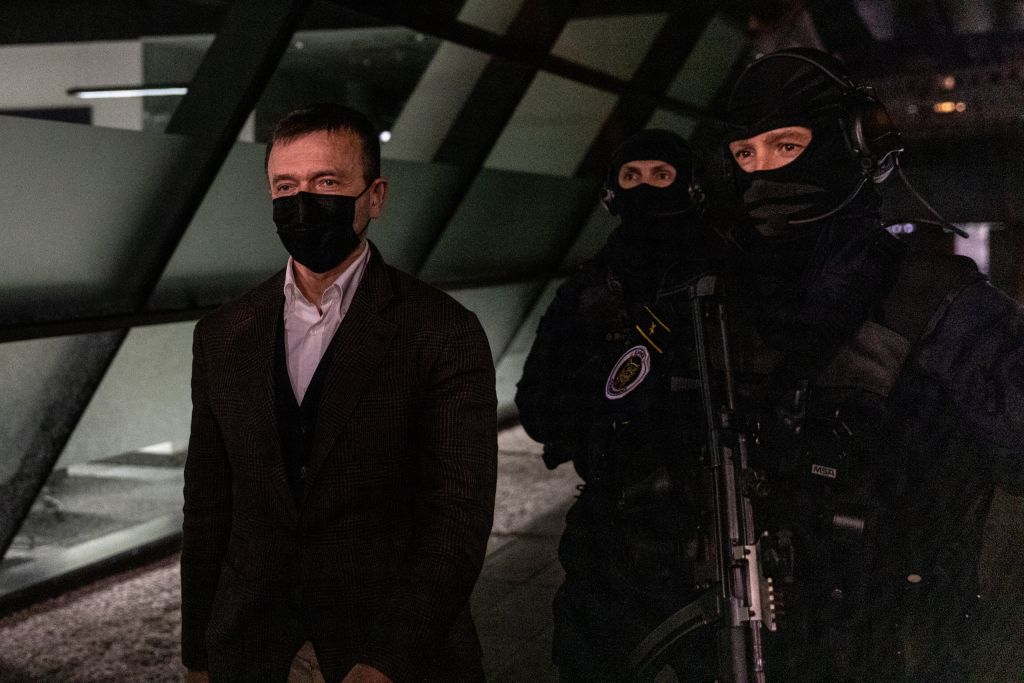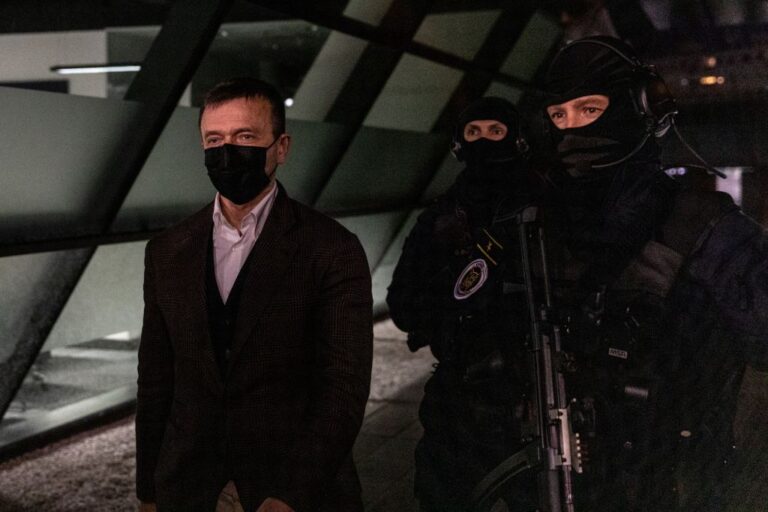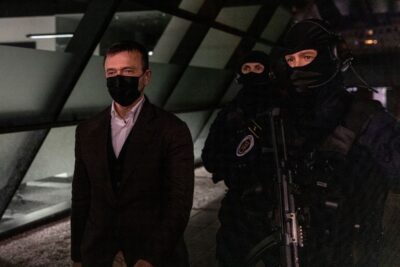On 1 December 2020 dozens of special police commandos wearing balaclavas and armed with submachine guns entered Bratislava’s Digital Park building, well known as the headquarters of Penta, an influential private-equity firm. With a number of investments in Slovakia, the Czech Republic, Poland, Hungary, and the Netherlands and its mother company registered in Cyprus, Penta is a major player in the financial market in the Visegrad region.
Although such a demonstration of the rule of law in Slovakia might seem surprising, the target of the police operation was not: the co-owner of Penta, Jaroslav Haščák, a controversial and powerful tycoon.
Immediately after his arrest, Slovak social media was flooded with hundreds of jokes about how the police had opened the first window of the 2020 Advent calendar 2020 on 1 December. In fact, Haščák’s apprehension was followed by other important arrests on 2 December, including those of allegedly corrupt public servants, former policemen, prosecutors, secret service agents, and businessmen. The police campaign is a result of anti-corruption promises that won the election for the parties forming Prime Minister Igor Matovič’s government.
Jaroslav Haščák is one of the most powerful people arrested in recent months in Slovakia. Haščák allegedly makes use of his enormous yet hidden influence behind the scenes of Slovak politics to extend his financial empire, already valued at hundreds of millions of euros per year. According to the Slovak edition of Forbes magazine, he is the second richest Slovak with assets worth more than 1 billion euros.
The history of Penta Investments Limited dates back to 1994. A decisive year for Penta was 1997, when it gained control over the VÚB Kupón fund, which managed more than 100 companies, and the value of its assets reached 9 billion crowns. Penta acquired a majority in these companies, restructured them, and subsequently sold them for a profit.
Today, Penta is active in finance, energy, manufacturing, healthcare, retail, entertainment, media, and real estate. According to Bloomberg, its assets were worth 11.2 billion euro in 2019.
Penta is considered the most influential player in Slovak healthcare, as it owns a health insurance company, a number of hospitals and clinics, a large network of pharmacies (that is expanding throughout Central Europe), and health labs. It also owns the second-most-read daily in Slovakia, Pluska; the most-read weekly, Plus7dní; the economic weekly Trend; and a 40-percent share of the daily SME. Among its assets are two banks, Privatbanka and Primabanka; one of the largest producers of aluminum, Slovalco; and betting company, Fortuna. In the Czech Republic, Penta owned Aero Vodochody and owns Vltava Labe Media. In Poland, Penta has invested in Iglotex, a producer of frozen foods; Empik; and EMC Instytut Medyczny, a medical company. Penta has also invested in a number of real estate projects in Bratislava, Prague, and Warsaw.
The Gorilla files
Since the mid-nineties, rumors about Penta’s and Haščák’s influence on Slovak politics and business have circulated throughout the country. However, almost no investigations of alleged shady deals or suspected corruption practices have ever been launched.
With the leak of the Slovak secret service (SIS) Gorilla files in 2011, the actual influence Haščák could have had on political and business circles in Bratislava was fully exposed.
Gorilla is the codename of a covert operation run by the SIS, as part of which the secret service recorded Haščák’s conversations with politicians and public servants in 2005 and 2006. These meetings were held in a secret flat in the center of Bratislava.
The operation began when the head of SIS’s analytical department, Peter Holúbek, noticed interesting cars often parked in front of the building on Vazovova Street in Bratislava where he lived. He soon realized that they were the limousines of politicians and influential entrepreneurs. The apartment next to his was owned by Zoltán Varga, a former security guard and businessman, who was nicknamed Gorilla because of his appearance.
At that time, the Bratislava Regional Court confirmed SIS’s request to wiretap the apartment. The Constitutional Court, however, on the proposal of the owner of the apartment, ruled years later that the operation was illegal as it was not sufficiently substantiated.
Secret service technicians made a small hole in the wall between the apartment of the SIS analyst and the place where interesting meetings were taking place. Wiretapping began. Holúbek made reports on the recordings. According to the recordings, the flat was the site of meetings betweens Penta CEO Jaroslav Haščák and the then Minister of Economy Jirko Malchárek and the chairwoman of the executive committee of the National Property Fund, Anna Bubeníková, who was responsible for privatization projects. Discussions covered sales of state property, alleged manipulation of such sales, and the subsequent payment of alleged bribes.
Visitors to the apartment spoke about the privatization of companies such as Steam-Gas Cycle, heating plants in Bratislava, Radiocommunications, distribution companies VSE, SSE and ZSE, Bratislava Airport, Transpetrol, Cargo, ZSNP Žiar nad Hronom, and many others.
Cola for Fico
Another prominent visitor to the apartment was the chairman of Smer-SD, Robert Fico, then an opposition member of parliament. Later he became prime minister of the country and served for 10 years. He stepped down after the murder of Jan Kuciak.
The alleged discussion between Haščák and Fico has enriched Slovak political slang. When Haščák asked what he could get Fico to drink, Fico answered “Cola.” Since then, Slovaks have been making jokes about Fico drinking cola. During celebrations of Smer-SD’s electoral victory in 2012, Fico was photographed holding a bottle of Coca-Cola, reminding his critics of the alleged discussion. His party won an absolute majority in parliament despite the publication of the Gorilla files during the run-up to the election.
According to the Gorilla files, Fico and Haščák discussed in the wiretapped apartment the influence of the oligarchs behind Fico’s party, Smer –Juraj Široký, Vladimír Poór, Ivan Kiňo – and their business dealings with the state.
They also spoke about alleged illegal party funding and Penta’s medical business. While Haščák was describing his business plans, Fico assured him that he could count on his party’s healthcare expert, Pavol Paška.
Wiretapping ended in 2006 after it was revealed, and no more meetings took place in the flat. The secret operation did not result in the investigation of any suspected corruption.
According to Aktuality.sk, a current investigation is examining whether there was an agreement between Haščák and Ľubomír Arpáš, a SIS official at the time, to obtain the recordings for a bribe of 6 million Slovak crowns (approx 200,000 euro). In any case, the Gorilla tapes and files disappeared.
This might be the reason why Jaroslav Haščák ended up in the hands of the police a few days ago. He has been charged with bribery and money laundering connected to the obtaining of the Gorilla tapes. The police have not yet released any further details about the investigation, issuing only a short statement: ‘During an operation conducted by the National Criminal Agency, we detained two people, and three people were charged with a crime.’
The third person charged is the wife of Arpáš, who was also a member of the secret service in the past.
Alleged money laundering is connected to the way police call bribes. Mr. and Mrs. Arpáš established a company that became a partner of another firm controlled by Jaroslav Haščák and were paid for allegedly fictional consultation services.
An important detail should be added. According to the investigation, contact with Arpáš was maintained through Haščák’s and Penta’s security advisor, Alojz Lorenc. Lorenc was the last director of the communist secret service in Czechoslovakia before the fall of the regime. He was prosecuted for secret service actions in the months leading up to the 17 November 1989 student march on Prague’s Národní třída that led to the fall of communism in Czechoslovakia. Haščák has also had ties with Russian elites in the past. In 1993 he graduated from the Moscow State Institute of International Relations (MGIMO), an elite university for training communist diplomats. In 2013, he made a “significant contribution” to MGIMO’s development fund.
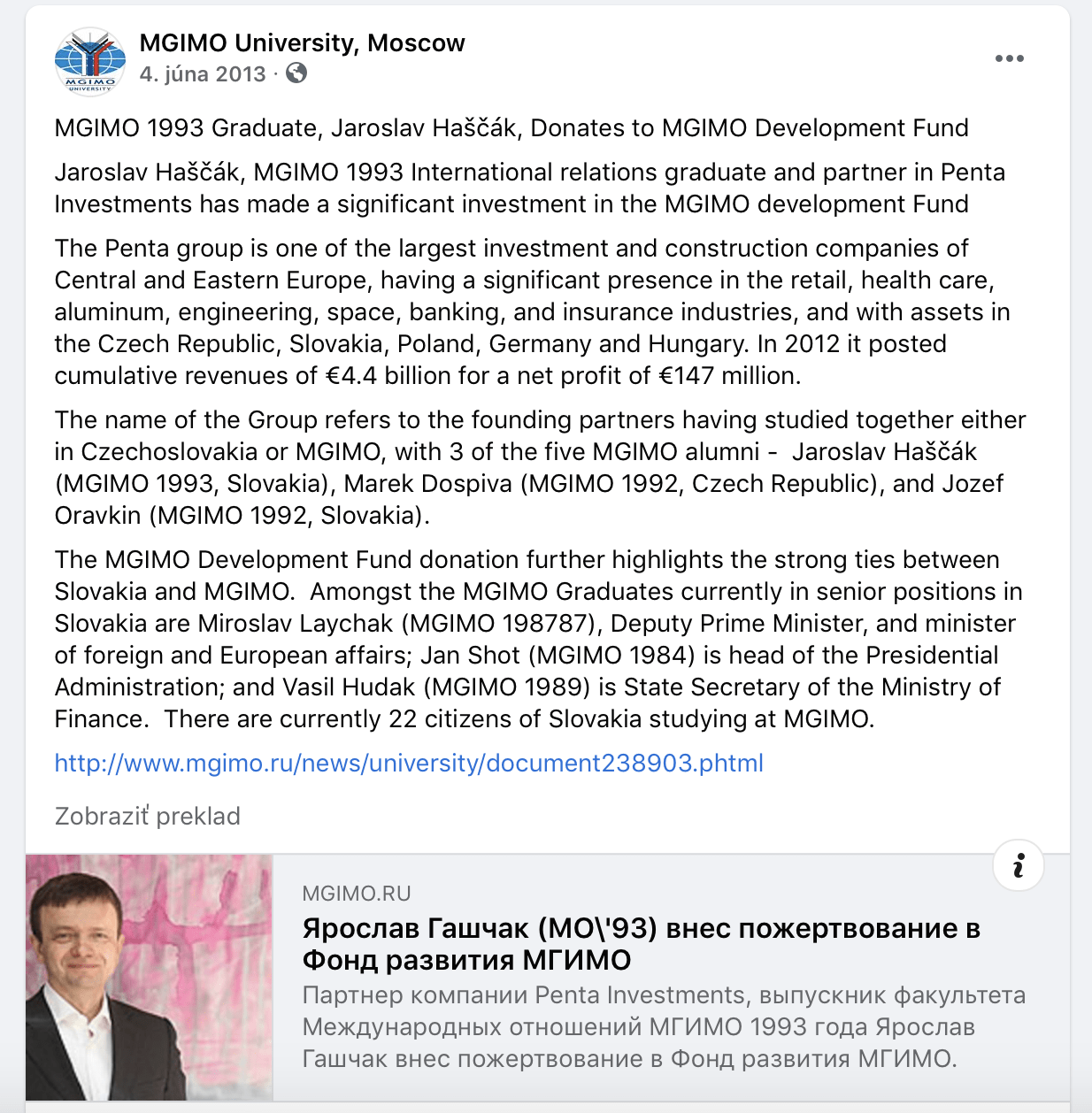
Haščák’s lawyers claim that the current investigation of acts from 15 years ago is unlawful. Nevertheless, he has resigned from all executive positions in Penta, but still remains a co-owner of the company. Iain Child will take over his management role. Haščák has announced that he will use all legal means to protect himself.
‘We consider the police raid on the premises of our company, as well as the indictment of Penta co-owner Jaroslav Haščák, to be unfounded and disproportionate. Jaroslav Haščák has always provided his full cooperation in this matter, as well as during the more-than-eight-year investigation of the Gorilla case’, wrote Penta in a statement.
One of Kočner’s friend?
‘I would rather live with the reputation of a corrupt person and have a gorilla head than be associated with murder,’ said Jaroslav Haščák in March 2019 in an interview with Aktuality.sk, when asked about his involvement in the slaying of investigative journalist Ján Kuciak and his fianceé, Martina Kušnírová.
Haščák decided to give a rare public interview after investigators into Kuciak’s murder discovered that one month before the killing the journalist received a text message from Marian Kočner about “cutting [his] fucking dick off.”
Kočner was later charged with masterminding the journalist’s murder, but he was acquitted by a court in September. There is a pending appeal of a prosecutor at the Highest Court. For years Kočner was in frequent contact with Haščák, and he used the Penta-owned Privatbanka for his deals.
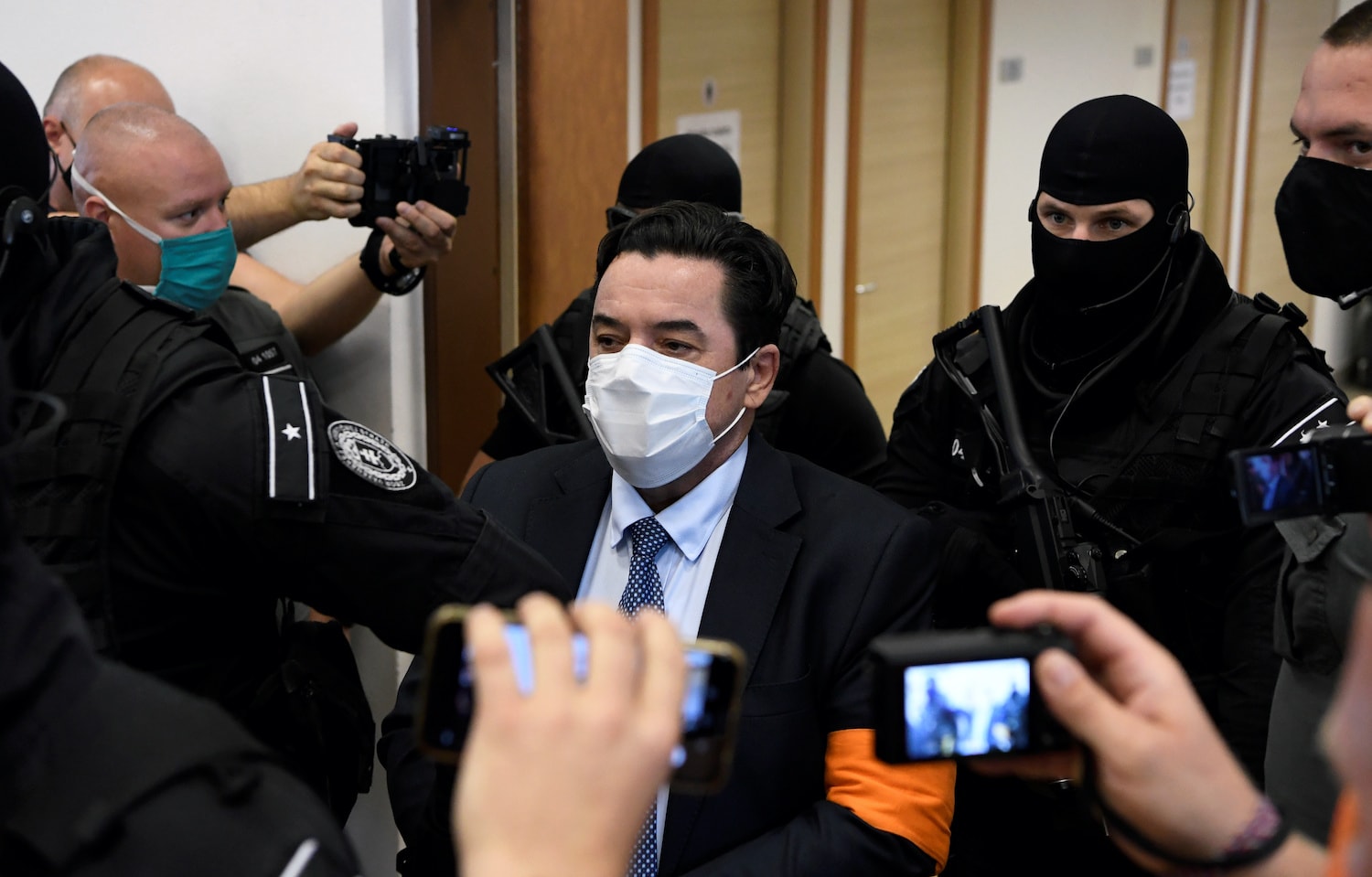
Marian Kocner walks inside the courtroom to receive his verdict in Pezinok, Slovakia September 3, 2020
Photo by RADOVAN STOKLASA / Reuters / Forum
There is no evidence of Haščák’s involvement in the killing. Besides the murder trial, Kočner is also facing charges for economic crimes. A court of first instance has sentenced him to 19 years in prison for fraud.
It has been whispered about for many years in Slovakia that Penta officials, including Haščák, have connections in the highest political circles. However, only the Gorilla files revealed behind-the-scenes agreements, contact with politicians, or suspicions of corruption. In 2011, just a few months before the parliamentary elections, an anonymous source posted on the internet all the analytical reports made of the wiretapped discussions between Haščák, politicians, and businessmen.
The recording itself was missing, but the posted materials sparked popular protests. A special police team has been assigned to investigate this case, but it has yet to produce significant results.
The police’s investigative efforts have been blocked several times by special prosecutor Dušan Kováčik. According to Denník N, he prevented the police from interrogating former SIS analyst Petr Holúbek and former SIS director Ján Valko.
‘There is no doubt that Kováčik, in this case, hindered the course of proving the Gorilla,’ said Marek Gajdoš, the former head of the Gorilla police investigation team, in an interview with Aktuality.sk after he left the force in 2017. He also revealed that he faced pressure during the investigation. Kováčik, for example, initiated disciplinary proceedings against Gajdos, depriving him of the case of Gorilla recordings transaction.
A prosecutor behind bars
Kováčik, who had headed the special department responsible for prosecuting corruption, crimes committed by politicians, and organized crime since its establishment 14 years ago, ended up behind bars a few weeks ago.
His colleagues charged him with corruption and membership in a criminal organization. According to a cooperating witness, once a member of the gang of policemen consisting of the highest management of Slovak police, Kováčik not only blocked certain investigations, but he is also charged with leaking information from investigations to organized crime, for example, in the case of the planned murder of an investigator from Special police force.
After Kováčik’s arrest, a new prosecutor became responsible for the Gorilla case. This change resulted in the latest arrests, including Haščák’s. It seems that while there is no new evidence, no one is evidently blocking the investigation and resulting legal actions.
It also seems that Arpáš, the former SIS agent, did not do his part of the deal properly, despite the alleged payment from Haščák.
Until October 2019, it appeared that only the transcripts of the tapes had survived, whereas the audio recordings that could prove their accuracy and authenticity had been lost.
The murder of investigative journalist Ján Kuciak and his fiancée, Martina Kušnírová, resulted in fundamental progress in the Gorilla case. During the investigation into the murder, it became clear that one more person possessed the Gorilla tapes: Marian Kočner.
According to the findings of the Jan Kuciak Investigative Center (ICJK), from the project Kočners Library on the recounding found in Kočners possession by investigators he has said that he was being paid one million euro for the Gorilla recording. Much more than Arpáš. But again, Kočner did not destroy all the tapes and hid one in the safe of his friend, Dobroslav Trnka, the general prosecutor at the time.
According to the findings of the ICJK from the project Kočnerova Knižnica, it seems that Trnka and his companions tried to blackmail Haščák with the Gorilla case again. An audio recording from Kočner’s mobile phone captures an emotional conversation between Kočner and Trnka (at the time, still one of the most powerful public servants in Slovakia, prosecutor general), who were arguing about racketeering of Haščák with the Gorilla tapes. In the recording Trnka behaves as if he were Kočner’s slave. Years before this phone call, they had installed a hidden camera in the general prosecutor’s office to record Trnka’s meetings with official visitors.
It was no secret that Trnka might have had access to the Gorilla tapes. Jaromír Čižnár, who succeeded Trnka as prosecutor general, testified in 2019 that Trnka played parts of the recordings to him in 2008 or 2009. This supposedly happened during a meeting at the Office of the Government of the Slovak Republic, at which, according to Čižnár, then Prime Minister Robert Fico was also present.
Čižnár stated at a press conference that Trnka went to several places with his laptop.
When Kočner became a prime suspect in the murder of Ján Kuciak and Martina Kušnírová, the police searched his home. They found a USB flash drive that, with the highest probability, included an audio recording of the wiretapped Gorilla apartment.
The police team investigating the murder of Kuciak passed the Gorilla tapes to the team investigating Gorilla. Subsequently, Kováčik got involved in the case again. As Aktuality.sk revealed, he first verbally requested the original recording. However, investigators resisted and sent him only a copy. Kováčik then asked for the original in writing. He never got it.
A link to 39 hours of recordings, allegedly of the entire Gorilla tapes, was sent by an unknown source on 16 October 2019 to the editors of several Slovak media outlets. It also appeared on the internet and began to spread freely. If someone repeatedly paid for the disappearance of the Gorilla tapes and made an effort to destroy them for 14 years, they got a bad deal in the end.
Today, the key actors in this case face criminal charges. Business tycoon and Penta co-owner Jaroslav Haščák is charged with bribery and money laundering, former secret service official Ľubomír Arpáš with bribery and money laundering, special prosecutor Dušan Kováčik with corruption and membership in a criminal organization, and former prosecutor general Dobroslav Trnka with abuse of power by a public official.
Tomáš Madleňák is a Slovak journalist who has worked for the Investigative Center of Ján Kuciak since 2020. He is based in Bratislava.
Lukáš Diko is the editor-in-chief at the Investigative Center of Ján Kuciak (ICJK). An experienced journalist and media leader, he was previously director of news and journalism at RTVS and editor-in-chief of news at Markíza television.

